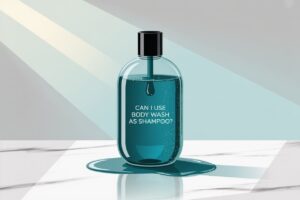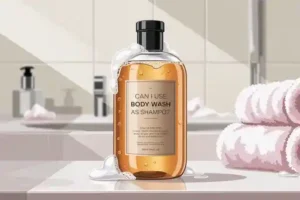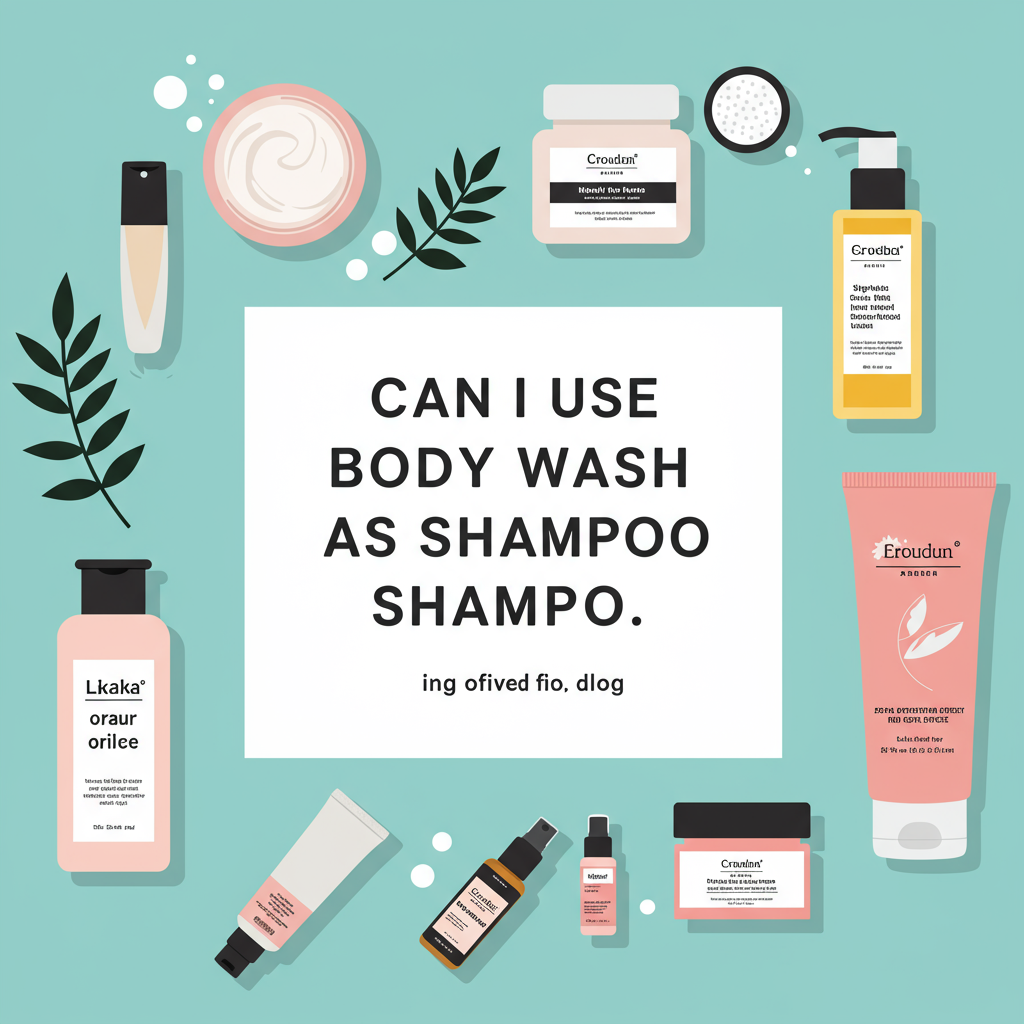We’ve all been there: standing in the shower, half-awake, only to realize the shampoo bottle is empty. Panic sets in. Your eyes dart to the body wash. It’s a cleanser, right? It lathers. It smells good. The burning question arises: can I use body wash as shampoo? This common dilemma sparks curiosity and, for many, a moment of desperation. While it might seem like a quick fix, the answer isn’t a simple yes or no. There are significant differences between these two cleansing products, and understanding them is key to maintaining healthy hair and scalp.

This comprehensive guide will dive deep into the world of hair and skin care, exploring the distinct formulations of body wash and shampoo. We’ll uncover what truly happens when you use body wash on your hair, discuss the potential immediate and long-term effects, and provide practical advice for those emergency situations. From understanding ingredients to suggesting healthier alternatives, we’ll equip you with all the knowledge you need to make an informed decision and ensure your hair stays happy and healthy, even when you’re in a pinch.
The Core Differences: Body Wash vs. Shampoo
To truly understand whether you can use body wash as shampoo, we need to appreciate the fundamental differences in their design and purpose. While both are designed to cleanse, their targets and methods are quite distinct.
Purpose and Formulation
- Shampoo: Primarily formulated to cleanse the hair and scalp. Its main goal is to remove excess oil (sebum), dirt, product buildup, and environmental pollutants from your hair strands and follicles. Shampoos are often designed with specific hair types in mind – oily, dry, fine, thick, color-treated, etc. – each with a tailored blend of ingredients.
- Body Wash: Designed to cleanse the skin on your body. The skin on your body is generally less oily and more resilient than your scalp, and its primary concerns are often hydration, gentle cleansing, and fragrance. Body washes tend to be milder, more moisturizing, and have a pH level closer to that of your skin.
Key Ingredients
The magic (or potential mayhem) lies in the ingredients:
- Surfactants: Both products contain surfactants, which are cleansing agents that create lather and lift away dirt and oil. However, shampoos typically use stronger surfactants (like Sodium Laureth Sulfate or Ammonium Lauryl Sulfate) to effectively break down scalp oils and product residue. Body washes often use milder surfactants (like Cocamidopropyl Betaine or Decyl Glucoside) to avoid stripping the skin’s natural moisture barrier.
- Conditioning Agents: Shampoos often include light conditioning agents to prevent hair from becoming too dry or tangled after cleansing. Body washes, on the other hand, usually contain heavier emollients, humectants, and oils to hydrate and moisturize the skin, which can leave a residue on hair.
- pH Levels: The pH balance is crucial. Healthy hair and scalp have a slightly acidic pH (around 4.5-5.5). Shampoos are generally formulated to match this, or at least be close enough to not disrupt it significantly. Body washes often have a slightly higher, more alkaline pH, closer to that of skin, which can cause the hair cuticles to lift, leading to frizz and dryness.
- Fragrances and Dyes: While both can contain these, body washes often have stronger, more persistent fragrances and sometimes dyes, which can be irritating to a sensitive scalp or leave unwanted residue on hair.
So, Can I Use Body Wash As Shampoo? The Short Answer and The Long Answer
Now for the million-dollar question: can I use body wash as shampoo?
The ‘Yes, But…’ Scenario (For Emergencies Only)
In a true pinch, if you have absolutely no other option, you *can* technically use body wash to cleanse your hair. Think of it as a one-time, desperate measure, not a regular practice. Here’s when it might be “acceptable”:
- Extreme Emergency: You’re traveling, forgot your shampoo, and there’s no store open.
- Very Short Hair: If you have a buzz cut or extremely short hair, the potential for damage and residue buildup is significantly less.
- Occasional, Light Cleansing: If your hair isn’t particularly dirty or oily and you just need a quick rinse to feel fresh.
- Certain Hair Types (with caution): Hair that is naturally very oily might tolerate the stronger cleansing action once, but it risks stripping too much oil.
Even in these scenarios, proceed with caution and follow our tips below to minimize potential harm.
The ‘No, And Here’s Why’ Scenario (For Regular Use)
For regular hair washing, the answer is a resounding no. Using body wash as shampoo consistently can lead to a host of problems for your hair and scalp:
- Dryness and Brittleness: The harsher surfactants and higher pH can strip your hair of its natural oils, leaving it dry, brittle, and prone to breakage.
- Frizz and Dullness: When hair cuticles are lifted (due to pH imbalance), hair becomes rough, frizzy, and loses its natural shine.
- Residue Buildup: The moisturizing agents in body wash, while great for skin, are too heavy for most hair types and can leave a greasy, waxy residue that weighs hair down and makes it look dirty, even after washing.
- Scalp Irritation: Stronger fragrances, dyes, and incompatible pH levels can irritate the sensitive skin of your scalp, leading to itching, redness, or flakiness.
- Color Fading: For color-treated hair, the harsh cleansing agents can strip hair dye much faster than a color-safe shampoo.
Your hair and scalp are delicate ecosystems, and they thrive when treated with products specifically designed for their unique needs.
What Happens When You Use Body Wash On Your Hair?
Let’s get down to the nitty-gritty of the immediate and long-term effects you might experience if you decide to use body wash on your hair.
Immediate Effects
The moment you rinse, you’ll likely notice:
- Unusual Lather: While body wash lathers well, it might feel different on your hair, possibly denser or less “slippery.”
- Squeaky Clean Feel (Too Clean): Your hair might feel excessively “squeaky” after rinsing. This isn’t a good sign; it indicates that natural oils have been completely stripped, leaving your hair vulnerable.
- Tangled Mess: Without the conditioning agents found in shampoo, your hair is likely to become a tangled, matted mess, making it difficult to comb through.
- Greasy Residue (Paradoxically): Despite stripping natural oils, the heavy moisturizers in some body washes can leave a waxy, greasy film, especially on finer hair. This can make your hair look dull and feel heavy.
- Frizz and Static: The disrupted pH balance can immediately lead to lifted cuticles, resulting in increased frizz and static electricity once your hair dries.
Long-Term Consequences
Consistent use of body wash on your hair can lead to more severe issues:
- Chronic Dryness and Damage: Repeated stripping of natural oils weakens the hair shaft, making it dry, brittle, and prone to split ends and breakage.
- Scalp Health Issues: The scalp can become excessively dry, itchy, flaky, or even overproduce oil to compensate for the stripping, leading to an oily scalp with dry ends. Irritation can worsen existing conditions like dandruff or dermatitis.
- Dull, Lifeless Hair: Hair loses its natural luster and bounce, appearing dull and heavy due to residue buildup and cuticle damage.
- Hair Loss (Indirectly): While not a direct cause, an unhealthy, irritated scalp can contribute to hair thinning or exacerbate existing hair loss conditions.
- Reduced Hair Growth: A compromised scalp environment is not conducive to healthy hair growth.
When Desperate Times Call for Desperate Measures: Tips for Using Body Wash as Shampoo (If You Must)
If you absolutely must use body wash as shampoo in an emergency, here are some tips to minimize the potential damage:
- Dilute It: Mix a small amount of body wash with water in your palm before applying. This reduces the concentration of harsh ingredients.
- Use Sparingly: You need far less body wash than you might think. A pea-sized amount is usually sufficient for short to medium hair.
- Focus on the Scalp: Your scalp is where most of the oil and dirt accumulate. Gently massage the diluted body wash onto your scalp, letting the lather flow down your hair strands rather than scrubbing the ends.
- Rinse, Rinse, Rinse: This is crucial. Rinse your hair thoroughly with cool or lukewarm water for at least a full minute to ensure all residue is removed. Leftover product will make your hair feel heavy and greasy.
- Follow with Conditioner (If Available): If you have any hair conditioner, use it! It will help restore some moisture and smooth the cuticles. Focus on the mid-lengths and ends.
- Limit Frequency: This cannot be stressed enough. Use body wash on your hair only once in an extreme emergency. Revert to regular shampoo as soon as possible.
- Choose Wisely: If you have options, pick a body wash that is labeled “gentle,” “moisturizing,” or “pH-balanced” and is fragrance-free or lightly fragranced. Avoid harsh antibacterial or heavily perfumed varieties.
Healthier Alternatives to Body Wash for Your Hair
Before you even consider using body wash on your hair, think about these smarter alternatives that are designed to cleanse your hair without the potential downsides:
Dry Shampoo
A lifesaver for extending time between washes. Dry shampoo absorbs excess oil and adds volume, making your hair look and feel fresher. It doesn’t actually clean your hair, but it effectively masks oiliness for a day or two.
Co-Washing (Conditioner Only Washing)
If your hair is dry or curly, co-washing can be a gentle way to cleanse. Many conditioners contain mild cleansing agents that can remove light dirt and oil without stripping moisture. Look for conditioners specifically designed for co-washing.
Baking Soda & Apple Cider Vinegar Rinse (Use with Caution)
This is a DIY option, but use it sparingly and with care. A paste of baking soda and water can act as a mild cleanser, followed by an apple cider vinegar rinse (diluted with water) to restore pH balance and add shine. Test on a small area first, as baking soda can be drying for some.
Bar Shampoo
These solid bars are essentially concentrated shampoos. They are excellent for travel, eco-friendly, and specifically formulated for hair. Many brands offer options for different hair types.
Just Water
If your hair isn’t heavily soiled or oily, sometimes a thorough rinse with just water can be enough to refresh it and remove light dust or sweat, especially if you’re planning to wash it properly the next day.
Recommended Products
Gentle Moisturizing Shampoo for All Hair Types
A mild, sulfate-free shampoo that cleanses effectively without stripping natural oils, suitable for daily use and sensitive scalps. A great staple to avoid shampoo emergencies.
Travel Size 2-in-1 Shampoo and Conditioner
Perfect for vacations or gym bags, this convenient product offers both cleansing and light conditioning, ensuring you never run out of proper hair care on the go.
High-Performance Dry Shampoo
Extend your wash days and refresh your hair instantly with a quality dry shampoo. An excellent immediate alternative when you can’t properly wash your hair.
Frequently Asked Questions About Using Body Wash on Hair
Here are some common questions people ask when contemplating, “Can I use body wash as shampoo?”
1. Can I use bar soap as shampoo instead of body wash?
Generally, no. Bar soaps are even more alkaline than most liquid body washes and are typically formulated with harsher ingredients designed for skin, not hair. Using bar soap on your hair is very likely to leave it dry, dull, tangled, and coated in residue, making it a worse option than body wash.
2. Is it okay to use shower gel as shampoo occasionally?
Shower gel is essentially another term for body wash. So, the same rules apply: only in extreme emergencies and with caution. It’s not designed for hair and regular use will lead to dryness, frizz, and residue buildup. Always prioritize a dedicated shampoo for optimal hair health.
3. What’s the best emergency shampoo substitute if I don’t have body wash either?
If you don’t even have body wash, your best bet is often dry shampoo. If that’s not available, a thorough rinse with just water can help remove some dirt and sweat. For a very oily scalp, a small amount of cornstarch or baby powder carefully applied to the roots can absorb oil, but be sure to brush it out well to avoid a white cast.
4. Will body wash damage color-treated hair?
Yes, very likely. Body washes typically contain harsher surfactants and have an incompatible pH level that can strip hair color much faster than a color-safe shampoo. The strong cleansing action can open the hair cuticles, allowing dye molecules to escape, leading to premature fading and dullness. Avoid using body wash on color-treated hair at all costs.
5. Can I use baby wash as shampoo?
Baby wash is a better emergency option than regular body wash because it’s formulated to be extremely gentle, tear-free, and often pH-balanced for a baby’s sensitive skin and scalp. While still not ideal for adult hair (as it lacks specific hair conditioning agents and strong enough cleansers for adult oil production), it’s less likely to cause significant damage or irritation in a one-off situation compared to standard body wash.
6. How often is it safe to use body wash on hair?
It is safe to use body wash on your hair zero times for routine washing. For emergency situations, it should be a one-time occurrence. Any more frequent use risks damaging your hair and scalp health. The goal should always be to use a proper shampoo as soon as possible.
Conclusion
The question, “Can I use body wash as shampoo?” often arises from a place of necessity, but the answer is nuanced. While it might offer a temporary solution in a dire emergency, body wash is fundamentally different from shampoo in its formulation and purpose. Designed for the skin, its ingredients can strip your hair of essential oils, disrupt its pH balance, and leave it dry, frizzy, dull, and prone to residue buildup.

For the sake of your hair’s health and vitality, it’s always best to use products specifically formulated for your hair and scalp. Keep a travel-sized shampoo, a dry shampoo, or even a bar shampoo on hand for those unexpected moments. If you absolutely must resort to body wash, remember to dilute it, use it sparingly, focus on the scalp, and rinse thoroughly. Treat it as a last resort, not a regular habit. Your hair will thank you for providing it with the specialized care it deserves, keeping it looking healthy, shiny, and vibrant.
